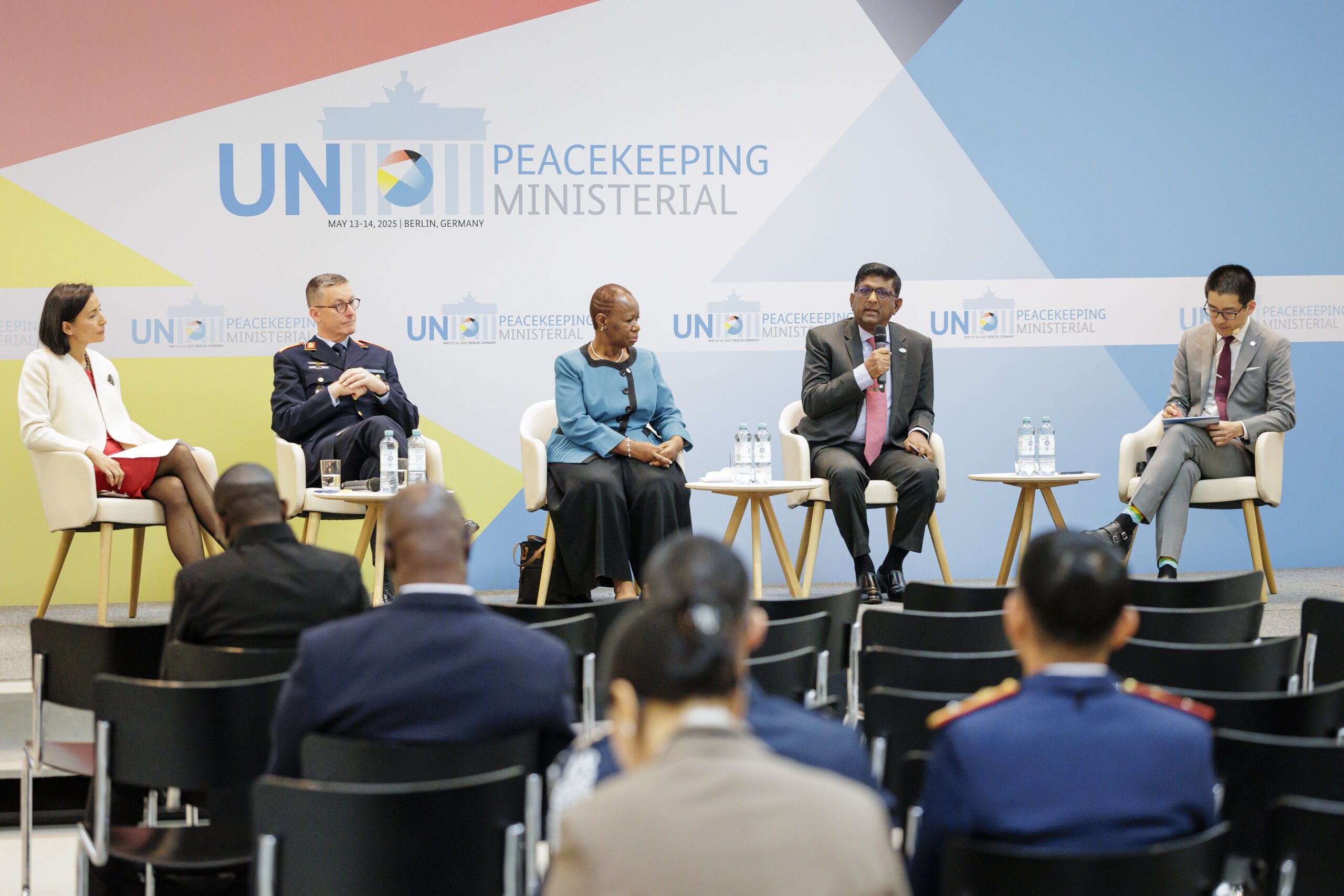While natural resource development can generate economic success, it can also increase the likelihood of conflict, particularly in Africa. Ongoing violence in Nigeria’s oil-rich Niger Delta is a good example of the so-called “resource curse” in action. In response, African governments continue to grapple with how best to use their resource endowments to foster both economic opportunity and peace. At a time of much soul-searching for the United Nations, there is a unique opportunity to put responsible and effective resource development at the heart of African peacebuilding. But how might local communities take greater ownership of these processes?
The UN Peacebuilding Commission is now examining where and how it can contribute to better management of natural resource development, as part of its newly enhanced mandate to seek prevention of global conflict. “We’ve been supporting the type of discussion that needs to happen between citizens and governments and between governments and companies,” Oscar Fernández-Taranco, UN Assistant Secretary-General for Peacebuilding Support, told me.
In Liberia, for example, the UN Peacebuilding Fund is looking to help improve resource contract management and community complaint mechanisms to ameliorate tensions that may lead to conflict. Over the last two years, Liberia has suffered from the effects of the Ebola epidemic and slumping global commodity prices. Resource extraction sites have correspondingly become loci of unrest, including hostage-taking and riots. The Liberian government sought support from the UN to improve, among other things, citizen engagement in natural resource investment deals, operations, and revenues. It is here—in helping manage the space between communities, governments, and companies—that UN agencies believe they are best positioned to act.
The African Union is also looking to develop greater community involvement in the extractive sector as it takes on more responsibility for ensuring peace and security on the continent. The AU adopted the African Mining Vision in 2009, followed by a corresponding Action Plan in 2011 and Country Mining Vision Guidebook in 2014. African regional economic communities have also developed additional governance frameworks. Notably, the Economic Community of West African States’ 2008 Conflict Prevention Framework includes initiatives for bolstering community involvement and empowerment around natural resources. These various plans all link natural resources to conflict prevention and stress the importance of community negotiation.
The UN and AU have in turn combined efforts to target illicit financial flows out of Africa. This is in keeping with the findings of February 2015’s Mbeki Report, which stressed the need for resource revenues to remain within their country of origin. The report also highlights unequal contracts that fuel bribery, tax avoidance through abusive transfer pricing, and the complicity of international financial institutions in these practices.
By restructuring natural resource contracts and limiting illicit financial flows, African countries may gain additional capacity to boost development and peacebuilding project spending. But this is by no means guaranteed to benefit remote communities, which are often negatively impacted by extraction projects, especially where government institutions are heavily centralized.
Building Resilience Through Local Engagement
According to the African Development Bank 2014 Annual Report, the extractive sector accounts for over half of Africa’s exports, and in some countries up to 90%. This level of dependency creates significant risks during commodity market downturns such as the one currently being experienced.
Increasing interaction between communities and the extractive industries can help to diversify the types of extractive activities that take place and better cater to companies’ procurement and labor needs. Isabelle Ramdoo, Senior Adviser at the African Minerals Development Centre, has outlined the value of dedicated local content policies within extractive operations, as a means of achieving this.
Increased community engagement can also improve social resilience. Greater dialogue and coordination between communities, companies, and governments may serve to prevent social tensions. As an October 2015 assessment of mining in Mali’s Kayes region notes, disputes between communities can arise over employment opportunities and the distribution of other benefits such as health centers or schools. In Kayes, company-community consultation processes failed to adequately consider negative impacts on villages outside of the mines’ direct areas. This heightened tensions over perceptions of unequal benefit distribution. Additionally, companies’ selective consultation and recognition of land title disagreements stirred inter-community disputes.
Increased land ownership and initiatives to formalize the extractive sector could reduce potential violence over natural resources, especially among vulnerable or marginalized groups. For example, a 2016 panel noted how legal frameworks could provide land rights and access to dispute resolution mechanisms for “artisanal” female miners. Additionally, formalization of this nature may offer avenues for dividends from the inclusion of women in peacebuilding processes. Improved and formalized community interaction with companies and governments around natural resources can prevent development of informal economies that may be more easily used to finance criminal or armed groups, and thus decrease fragility. Positive and mutually beneficial relations between communities and companies have, nevertheless, proven elusive until now.
From a business point of view, investing in responsible and locally focused operations can ensure a social licence to operate, as well as compliance with international standards such as the UN Guiding Principles on Business and Human Rights and those contained in the UN Global Compact. Proactive investment in community relations and conflict prevention may also reduce operating risks, thereby improving productivity and profit margins. As a 2005 International Alert guide for extractive industries outlines, conflict imposes costs such as destruction of materials, as well as temporary delays in operations from strikes, stoppages over safety concerns, and supply chain disruptions. A 2014 Harvard Kennedy School report examined 50 cases of sustained company-community conflict around the world and found that lost productivity resulting from delays was the most frequently cited, but often overlooked, financial cost of community-level conflict.
While many resources companies do pursue strong community relations through the lens of corporate social responsibility, a 2013 study from the Centre for Social Responsibility in Mining notes that community relations and development remain absent from the mining industry’s core business model. This means that when commodity prices drop, investment in these areas may suffer from cost-cutting.
The Pan-African Investment Code being developed by several of the continent’s governments offers an improved legal framework for companies operating in Africa. But further political commitment is needed to end the view of Africa as merely a lucrative business opportunity. “It cannot be that Africa is just a place where you go to do business in risky situations for high returns,” said Monica Juma, Principal Secretary at the Kenyan Ministry of Foreign Affairs and International Trade, at an International Peace Institute event in May this year. “This must come to the table in terms of stabilizing risk factors for Africa.”
Meanwhile, the mining sector and affected communities are facing new challenges such as climate change, making social and economic stability even more important for conflict prevention. Indeed, the African Development Bank’s High-Level Panel on Fragile States identifies issues around extractive industries, climate disruption, and resource conflicts as key drivers of fragility in Africa. Peacebuilding strategies must therefore promote conflict- and climate-sensitive contracts between all parties.
African Ownership for Sustainable Peace
Maged Abdelaziz, UN Under-Secretary-General and Special Adviser on Africa, told me that building the necessary linkages between resource extraction and resilience on the continent must begin with the AU. “The UN will not be able to start this kind of global approach on extractive industries because it will be faced with opposition from countries that have big multinational corporations that are benefiting,” he said.
Further progress will be tied to the UN and AU’s continued consideration of how best to pursue the concept of “sustaining peace.” The UN Security Council and General Assembly adopted identical resolutions in April this year advocating this new vision of peacebuilding, which moves away from a reactive, peacekeeping-heavy approach to the deployment of more preventative strategies. Improved natural resource governance in Africa, principally through increased community involvement, has the potential to prevent conflict by fostering inclusion and promoting resilient economic development. The UN and AU should therefore pursue improved dialogue with local stakeholders and more equitable contracts for resource development, while continually stressing the business rationale for doing so. This is an invaluable opportunity to create African ownership of African peacebuilding.
This article as originally published by the International Peace Institute (IPI) on July 18, 2016
Jonathan Rozen is an independent researcher on peacebuilding and violent extremism. | Twitter: @rozen_jonathan






